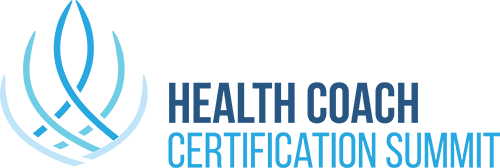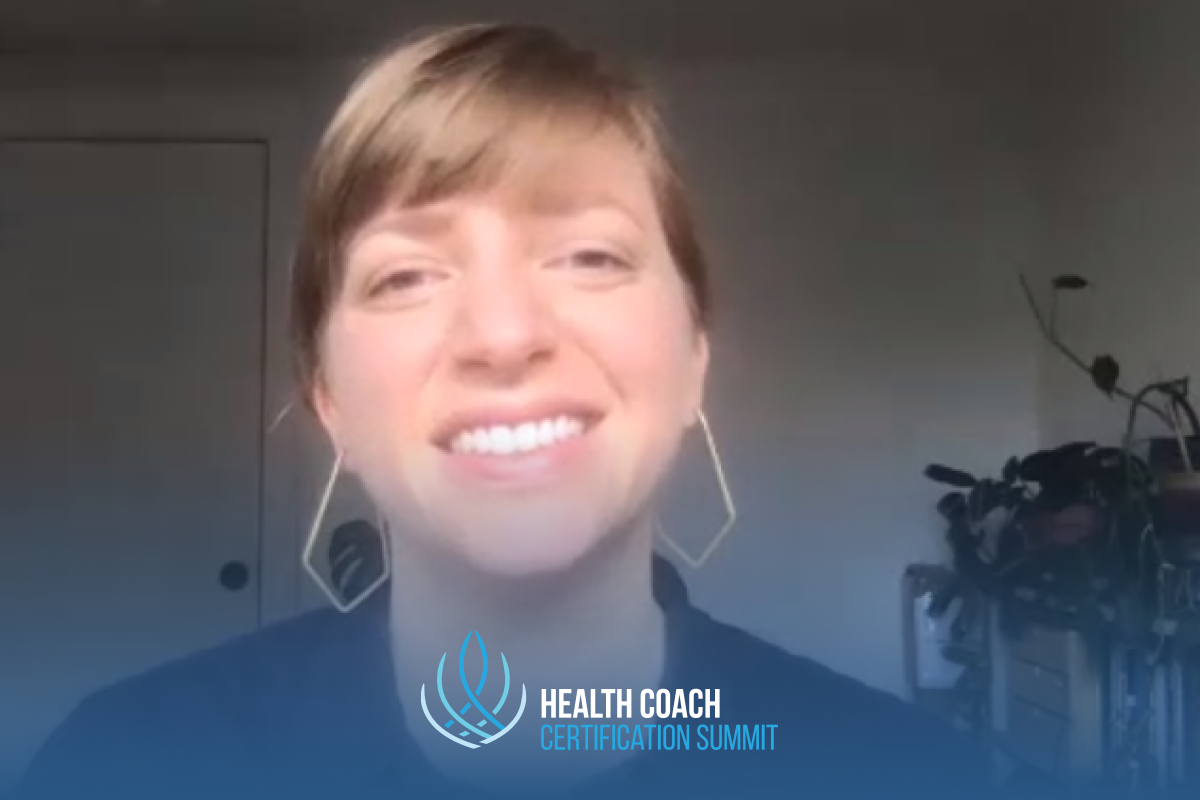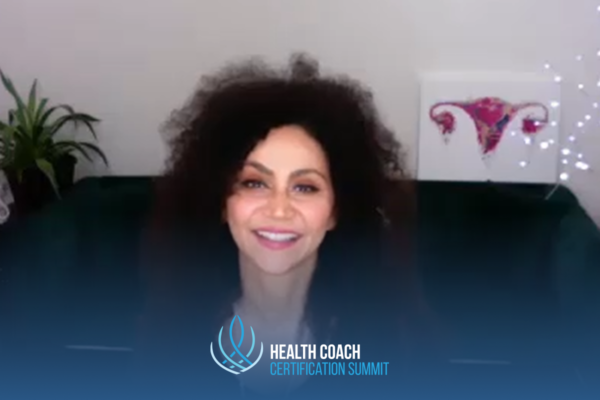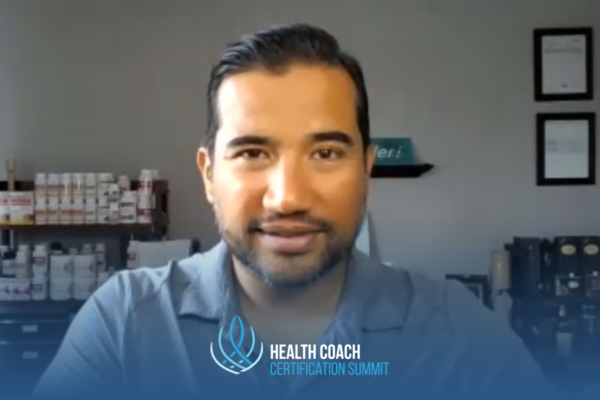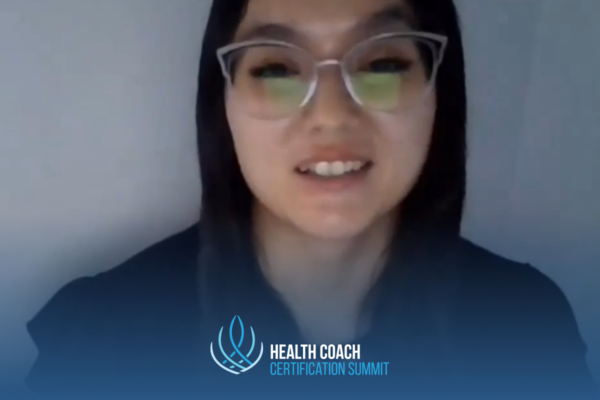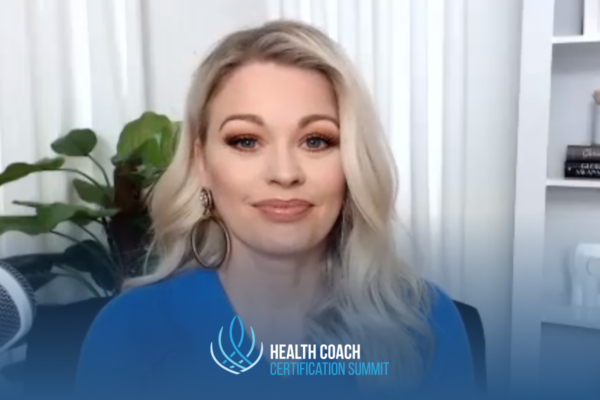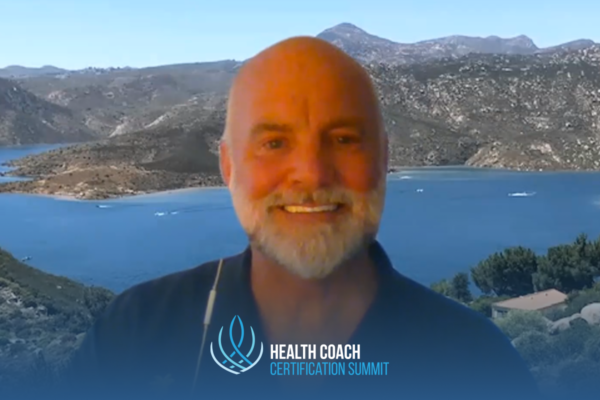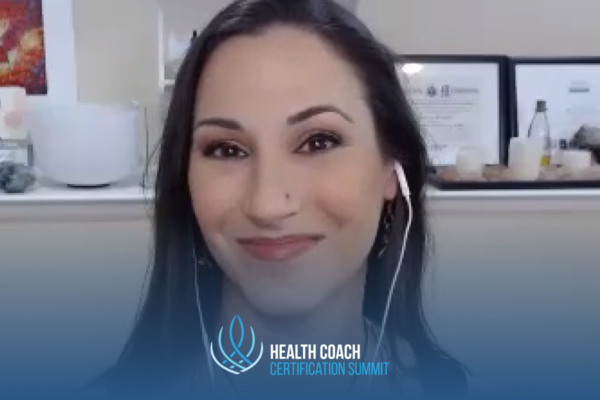Join the discussion below
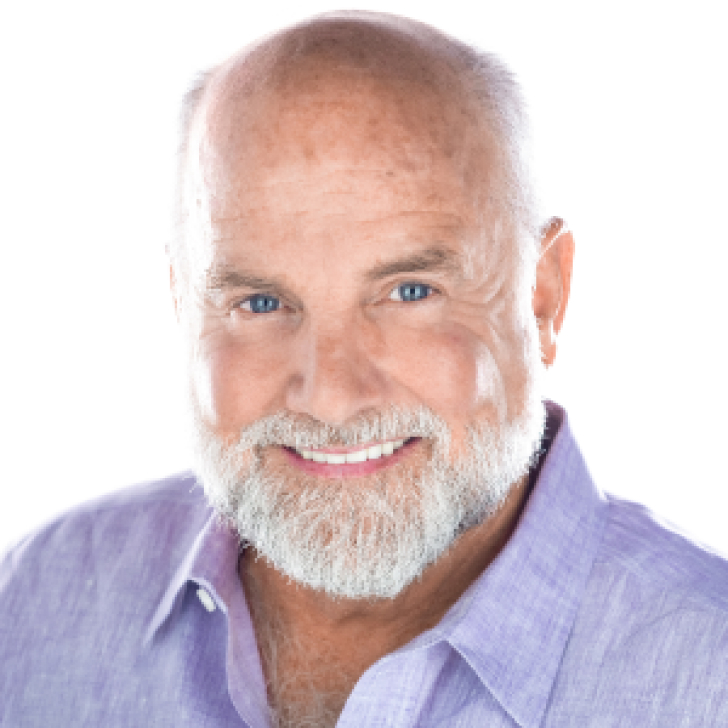
Reed Davis, Triple-Board Certified Holistic Health Practitioner (HHP) and Certified Nutritional Therapist (CNT), is an expert in functional lab testing and holistic lifestyle medicine. He is the Founder of Functional Diagnostic Nutrition® (FDN) and the FDN Certification Course with over 3000 graduates in 50 countries. Reed served as the Health... Read More
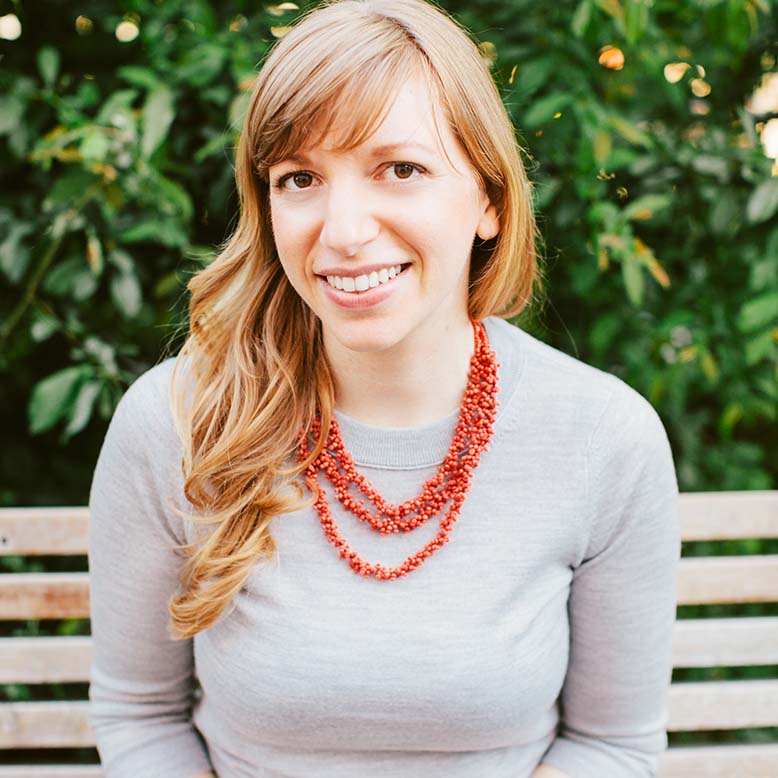
Lara Adler is an Environmental Toxins Expert & Educator and a Certified Holistic Health Coach who teaches health coaches, nutritionists, and other holistic health practitioners how to eliminate the #1 thing holding their clients back from the results they are seeking – the unaddressed link between chemicals and chronic health... Read More
The Certificate Course in Environmental Health is a 5-month online course for health professionals like health coaches, nutritionists, and doulas to nurses, MDs, DOs, DCs, NDs, and others, who are eager to integrate the topic of toxins into their practices.
This course explores the history of the environmental health movement, from the turn of the last century up to modern-day public policy around toxins, exploration of industry front groups, epigenetics, toxicology, and detoxification protocols. We also explore the majority of the potential exposures we experience in and around our homes, from home construction, furniture, and carpeting, to bedding, personal care products, indoor air quality, basement, garage, and lawn care.
The Certificate Course provides a strong emphasis on the practical application of how to integrate this knowledge into your practice. It also offers comprehensive support around starting or growing a business and includes small group business coaching on topics like niche, program offerings, marketing, best practices regarding the discussion of environmental health topics, and more.
This course is comprised of 20+ hours of lectures and 36 hours of group and private coaching.
Currently qualifies for 30 CEUs from the NANP
Reed Davis, HHP, FDN-P, CMTA, CNT
Hey, thanks so much for coming back folks, I’ve got a really exciting guest for you today, Lara Adler Adler. She’s a friend of ours, has been for a long time, and she’s one of the leading experts on environmental toxins. And she’s a great educator. She has a, she’s a certified holistic health coach herself, and she teaches other health coaches, and nutritionists, and all kinds of holistic health practitioners, what we call the allied practitioners, how to eliminate the number one thing, holding their clients back. And guess what that might be? That’s the unaddressed link between chemicals and chronic health problems. And she trains practitioners to become experts themselves in everyday toxic exposure so they can improve client outcomes. That’s the whole game, right. Now that’s, now Laura has found a way to do that without spending hundreds of hours researching yourself. She’s can teach you from the bottom line up, she’s actually has beginners and advanced courses.
So, we’re really excited to get to talk to her about that. And she’s got her own environmental health education not to mention business consulting, and she has helped thousands of health professionals over 25 countries around the world, elevate their skill set, get better results with clients and become the sought out leaders in the growing environmental health and detoxification field. Now, some of, you know too, that my background started out with environmental law and saving the planet. And 20 years ago, I turned that attention to, you know, from saving birds, bees, trees, what have you, to saving people hopefully. So, Lara Adler, I’m so glad that we have so much in common and look forward to this talk. Why don’t you tell us a bit about your background, how you got in here, and anything else you want to say, this is a chance for you to shine and let the folks know who Lara Adler Adler is?
Lara Adler
Yeah, well first thanks for having me and inviting me to be part of this event. You know, that we are in the same corner in terms of helping people transform their health just from different perspectives. So, you know, I think it’s, my story in terms of how I got into this space is a little bit different from a lot of
people in the health arena, in that a lot of people step into the health space because they had their own health issue that they had to learn how to overcome on their own. They were kind of failed by the conventional model, they dug in, did the work, you know, transformed their health and then felt so inspired to help other people. It is not my story at all. I did not experience health issues related to environmental chemical exposures. That’s not how I turned onto this space.
It was really, I say kind of by accident. I have, I’ll share the kind of part, it’s kind of an interesting twist to my story. So, I was always interested in health and nutrition. Like I, you know, got turned on to vegetarianism when I was in middle school and then veganism in high school and just because, and I’m neither of those things anymore. But, you know, that, that being in that space and eating that way at the time, I was like, okay, well I need to learn how to do this well, so that I don’t do it wrong and end up hurting myself. And so, I started researching not only about things like animal rights, which in turn led to the large agricultural industry as a whole CAFO, animal farming monocropping of farms, massive pesticide use, all sort of that perspective, but also into this health and nutrition space. And it was just something that I loved.
Like, I was the person in college that would, you know, bake my own, you know, muffins and do my own, petition the school cafeteria to provide dairy free milk because I didn’t drink milk. And I was that person who was always interested in that. But I didn’t actually think I would do anything professionally with it. I went into a whole other career in the photography field. And you know, it was really after feeling a little disillusioned with corporate photography sales. That just wasn’t, it’s not me. It wasn’t who I am. I got kind of turned into this like whole holistic health space and this whole idea of something called health coaching. And I was like, I don’t know what that is, but you know, maybe that’s the way that I can kind of flex this nerdy muscle that I’ve always had about health, where I’m like the farmer’s market person and, you know, I’m the person that’s going to visit farms to look at the egg production and make sure that it’s up to snuff for me personally. Maybe getting a certification as a health coach was a way for me to flex that muscle.
And so, I left my photography career and I turned towards health coaching, went back to school, got certified. And I was like, okay, I am a health coach, but I had no idea what I was doing. Right. Which is what happens to a lot of people when they first get out of that first program where they get some kind of certification. And I, you know, I said, I don’t really know what I want to do, but let me just start somewhere. I started working with people around weight loss because I felt like that was, that was an easy thing for me to do. And I had success with a bunch of my clients who wanted to lose weight, you know, and then I had a handful of people where like, they did all the things that all the other people had done, but like their weight didn’t change.
There was only like two or three people, but it was enough that I was like, I must be missing something. I must be missing something. So, I started to dive into the literature around resistant weight loss, and I kind of cracked open the door of this whole field of environmental health, environmental medicine, environmental toxicity, and how it relates to the chronic health issues people are having, including weight gain and resistant weight loss. And like one, I was so fascinated by this, like just completely captivated by this topic that I was like, I just want to do this all day. Like, I just want to read this stuff.
But also I was kind of like frustrated and outraged because I’d spent so much of my life reading up about nutrition and I’d spent, you know, thousands of dollars going back to school and like never was the topic of environmental toxicity part of the conversation. And I was just like, kind of dumbfounded by that. Like, whoa, well, wait a second, here we are teaching people how to modify their lifestyle, but we’re not giving them any, any education for the practitioner. And certainly none that we can pass onto the client or patient around what lifestyle modifications they can do to reduce their toxic burden. And I, the more I started researching about it and reading about it and going to all of the conferences and lectures that I, that I had access to in my area, the more I realized like this is actually what I want to do.
Like I don’t want to do, I don’t want to talk to people about kale and quinoa anymore. That is not, it doesn’t feel as important as this work of opening this door and, and filling this gap in education. And so, that’s sort of how I got here. However, that little, that little asterisk, small print. So, three years ago I went back to where I grew up. It was my dad’s 80th birthday. I went back to Connecticut where I grew up, went home. You know, when you go back to your parents’ house, you kind of go to your bedroom, your old high school bedroom, and you tinker around, you look at the old yearbooks and all this stuff. And I found, actually have it in the corner over there. I found, my dad sent it to me, a box of index cards from a paper that I’d written in 1992 in high school, on veganism or vegetarianism at the time.
And I just was randomly, first card I pulled out of the box three years ago was a quote, cause this was, you know, pre, I mean it wasn’t pre-internet, but we were still making our notes on index cards and going to the library and reading actual books, was a quote from a book saying the reason why people were turning to a vegetarian diet was partly because of the increase of synthetic chemicals in the environment. Toxic, synthetic. And I was like, huh. So, it was like 24, 25 years ago. And I was like, oh, maybe, maybe I did have a weird, subtle awareness about this long before it ever really crystallized in my mind. And I just, I sat there for like five minutes just staring at this card kind of tripped out like, hmm that’s… So, I like to share that little twist because I think it’s, maybe this is what I was supposed to be doing. I don’t know.
Reed Davis, HHP, FDN-P, CMTA, CNT
Well, from what I know about you. I think it’s what you’re supposed to be doing. Because I know you’re happy doing it and that you, it does let you flex those, those particular nerd muscles. And I totally get that it’s fascinating. You know, I can spend just hours online. And I know you do the same thing, cause I’m maybe making slides for a new lesson and I start exploring what I’m teaching, I go, well, let me make sure I understand this correctly. Cause I don’t want to just spout off, and I end up four hours later I’m still studying and going, wow. You know, it’s so fascinating. And I also love about your story, Lara Adler, is that you, you know, you didn’t have a particular health problem of your own, it’s just really interesting stuff. And most people in the coaching business had a, they had a thyroid, they had PCOS, they had this and they overcame it in some way.
Unfortunately, while they overcame it, which is a good thing, if you know, they think that everyone else could do the exact same thing they did and get the same results. And what we know is that that’s not true. Everyone has different causal factors. There’s different stressors, there’s different environments that they live in. So, what worked for you may not work for another person. And that’s something that I hope they also run into before they go, you know, teaching a lot, cause you can’t do, what worked for your neighbor may not work for you. But now we have a couple of different types of people in the audience and we want to speak to both of them, but you know, individually, it’s fine.
For the health coach out there, I think you’ve started to talk a bit about how cool your, you know, you have a program. And obviously from a nerd like you, you know, it’s going to be full of good research and things like that, but I also want to address any public that just, you know, look how Lara Adler got into this field by just having an interest. And maybe there was something planted in her high, a gift from her dad, or you know, whatever it was that was in her room a long time ago. You never know where those seeds might be planted. You know, like you might have just fallen in love with your seventh grade biology teacher and always wanted to cut open snakes or something, you know, but it’s okay to pursue your dreams and what turns you on and look how successful Lara Adler is too. So…
Lara Adler
Well, I think, you know, this is something that I share with my students. My practitioner students is, you know, we have to, we have to love the topic, the niche, the area that we focus in our business, we have to love it. We have to be willing to go to the mat for it. And the reason why is because the reality of running a business is very different from what people think it is. They think that like, oh, if I want to work with people that have diabetes, all they’re going to be doing is talking about diabetes all day, that is not true. The reality is that when you’re running a business, you’re also doing your bookkeeping, and your finances, and your marketing, and your social media, and your content creation, and your website creation, and your backend CRM, all of these like really boring administrative tasks. And if you don’t love the thing that you’re doing, you’re going to quickly grow resentful about all of the time that you’re spending doing administrative things. So, and then you’re going to go, why am I even doing this?
I don’t even like the thing that I do. So, my advice for people, whether they’re just, you know, not practitioners yet, but people who are still kind of thinking about maybe going down this path or people that are just starting out in their practice is like, get really crystal clear on what is the problem that your business solves and for what audience. Like, that’s your niche. And make sure that you love it. Don’t just pick it because like the universe told you to, or that this is who’s coming to me. I’ve had plenty of students who said, yeah, you know, all these people coming to me want to lose weight, but like, I’m actually more interested in this thing over here. So, then, you know, we have to be able to say no to some people so that we can say yes to the people that will fuel us and inspire us to continue to do this work. So, I just, I think that part is so important that it’s, we have to love what we do. Because the administrative stuff is real.
Reed Davis, HHP, FDN-P, CMTA, CNT
Yeah. Running a business can be quite a challenge and there are some health coaching jobs opening up. Now there’s the marketplace, if you will, is getting wise. Physicians typically had just like a nurse practitioner or just a front office person, whose job was to get their insurance card, bill the insurance, bill the CPT codes, you know, make sure that, you know, people are coming in the door. And, but now if they really want to make people well, gee, what a concept for a doctor’s office to have, you know, like they’re going to need more than just coming in with some symptoms and getting a prescription to make them go away. You know. So, I think, I think not everyone has, who wants to be a health coach, has to become a business person. There’s spots for you. They don’t pay as well as having your own business.
Lara Adler
But the upshot is you don’t have to focus on client attraction and retention. So, there’s pros and cons for certain. And whatever you, you know, like I don’t, to me, it’s, it’s, you know, most of my clients happen to be solo practitioners. They have their own businesses, but it doesn’t have to be that way. And I do think that, you know, we are seeing, especially in the functional space, but certainly starting to see it a little bit outside of the functional kind of bubble that we’re in, is that people are starting to say, okay, I need somebody who can help my clients or my patients, whatever, you know, whatever someone’s practice is, with this lifestyle stuff that like, I don’t have the time for. And I think there is absolutely a space for health coaches. I think it’s necessary to move forward. Millions and millions of people who are dealing with chronic illness. And, you know, I think that the whole, I mean, frankly, the whole model needs to shift because until the insurance model changes, you know, we’re a little bit hamstrung. And the people who often need our help the most don’t have the resources to afford that kind of, you know, non-insurance practitioner.
But I think that, yeah, there’s plenty of opportunity for partnership and collaboration in this space. And, you know, I think if, especially if we look at it through the lens of environmental health, environmental medicine, you know, the average medical school curriculum, which, you know, can be an eight year program, the average number of hours that are dedicated to environmental health is seven. If it’s offered at all, and many programs don’t offer anything at all. In those seven hours, what they’re really looking at are things like drug abuse, cigarette smoking, occupational exposures. They’re not looking at the chronic low level of exposures that we’re all getting every day. So, it’s not really like aligned with the reality of our exposome, so to speak. And so, you know, in the nutrition space, we get all like, oh my God, all self-righteous when we learn that the average MD only gets, you know, 19 to 21 hours of training in nutrition.
Well, they get far less than that in environmental medicine. And so, they don’t have the foundational training in it, which means that they have to decide to specialize in that field if they want to have, and there’s just not, if they want to have a deeper education in that. And you know, doctors can’t do everything. Like they can’t do all the things. So, they’re generalists. And then, you know, hopefully the idea is that let’s hire specialists, let’s hire people that have a background and a training in lifestyle, in nutrition, in environmental toxins. So, that they can add this sort of adjunct service to their practice. And I have students of mine that do that, that work in medical offices or that partner with chiropractors, or that partner with other types of practitioners, because they have the training to be able to help people around lifestyle and specifically around this environmental component.
Reed Davis, HHP, FDN-P, CMTA, CNT
Fantastic. So, there’s all this opportunity. This is funny. There was a gentlemen who was calling me to see if, you know, should I take your course, or you know, and I just told him about it. You can take it or not. I don’t push anyone around. You got to have a real hankering to get into this field. And he goes, yeah, but then even if I graduate, will, you know, how will I get any customers or where, where will I get any customers? I said, well, where do you live? He said, New Jersey. And I thought, I said, no, then, then don’t bother. There’s no sick people in New Jersey. You know, like how, of course there’s just millions of people everywhere. Let me go back. I know you agree with that, but let me go back to what you said, which I thought was astute and actually quite profound. The number one question, if you’re going to be in business, you need to ask, you said was basically who do you serve? Well, what problem do you solve first? And who do you serve? So, what problem do you solve?
Lara Adler
So, me, I filled the education gap for health professionals around environmental toxicity, so that they can do a better job working with their clients and patients. I’ll just give you a little example of that. So, let’s say you’re working, you know, somebody has a health practice that’s based on autoimmune disease, right. They work with people that have autoimmune conditions and they do all of these things. They help them with their sleep. They help them with nutrition. They help them with other, you know, supplementation to help them minimize autoimmune symptoms and ideally put that autoimmune condition into remission. But if they’re not addressing the constant and chronic environmental factors that can be triggers for autoimmune flares, that can be positive for autoimmune disease.
They’re missing an opportunity to take their client or patient further along on that, on that healing journey. And so, what happens is the client or patient gets part of the way, and then they get stuck. And then what often happens is it goes, oh, well, that practitioner didn’t really help me. They only got me here and that’s better than where I was, but like, I still don’t feel great or I’m still dealing with this. It’s still too much. And so, what happens is that practitioner, or sorry that that client, will then hop around from person to person, trying to find somebody who can take them all the way there. And, you know, what’s interesting, slash frustrating sometimes about the toxins space is we don’t know where on that spectrum, that any given exposure might be impacting them. It might be causative. It might just be exacerbative, if that’s a word. And so, you know, we want to make sure that it, look, the reality is the same chemical exposures that might lead to an autoimmune flare in one person might lead to a higher risk of diabetes in somebody else, or gut inflammation in another person.
And so, for me, yes, there’s certain toxic specific or chemical specific places that we can focus based on people’s individual health issues. But the bottom line is everybody needs to get rid of mercury in their seafood. Everybody needs to eliminate or minimize plastic use in the kitchen. Everybody needs to stop using fragrances and air fresheners and things like that, regardless of what your health issue. So, for me, like the problem that I solve is filling this education gap and offering fluency around this really complicated topic. My sort of Ninja skill set is in taking really complicated concepts, and ideas, and papers, and all of these different areas, and really assimilating it into a piece of information that is easily digestible for the practitioner. Like my courses are so heavily cited. All of the research is there, but it is a major time saver for my audience. My audience are people that want to help people get better. And they also recognize that in order, like the world is changing, information is changing all the time and they need to stay on this sort of upper edge of relevancy in terms of the information that’s coming in. And this is an area that is so highly relevant that most practitioners are lacking in significant and structural education on this. So, you know, my, yeah, that’s the problem that I solve.
Reed Davis, HHP, FDN-P, CMTA, CNT
And also you explained why you’re such a good teacher, you know, it’s because it is really complex, but you have this Ninja skillset for breaking it down and presenting it in a way, perhaps on a gradient where it’s digestible, you know, it’s digestible. Because if you just…
Lara Adler
And actionable.
Reed Davis, HHP, FDN-P, CMTA, CNT
You can’t have people, you know, they call it drinking out of a fire hose. You know, it’s not just information. The fact is that you’ve been in practice. You’ve also helped a lot of people. This isn’t something you learned on a few weekends, or by just studying books, you work with people, right. You actually help people now, probably not as much as you used to cause your business is consumed with, or pursuit of training others. You know, so now you’ve developed this community of toxic warriors or people who help others with their, what did you call it? The exosome?
Lara Adler
I call us the nerd herd.
Reed Davis, HHP, FDN-P, CMTA, CNT
The nerd herd.
Lara Adler
My students, I call it the nerd herd.
Reed Davis, HHP, FDN-P, CMTA, CNT
It’s beautiful.
Lara Adler
I don’t know. So, one of my students came up with it years ago and I was like, that’s amazing. So, and my Instagram is Environmental Toxins Nerd, so…
Reed Davis, HHP, FDN-P, CMTA, CNT
I’m going to use that and I will attribute it to you, Laura. That Laura calls her folk, her gang, a nerd herd.
Lara Adler
It’s a nerd herd.
Reed Davis, HHP, FDN-P, CMTA, CNT
Yeah. So, then that word you used for the exosomes, is that what you said? The…
Lara Adler
Exposome Yes. Yeah. And that’s just sort of a broad way of talking about all of the things that are external that are not internal, that we’re being exposed to. And the exposome certainly includes environmental chemicals, but it’s also like your life experiences and trauma and things that are out there that we are exposed to.
Reed Davis, HHP, FDN-P, CMTA, CNT
Exposure. Sure. Yeah. I think you’ve really done a good job of identifying, again, taking complex stuff and made it digestible. Healing is an interesting thing, isn’t it? You know, and it occurs, cause you alluded to this and just a different way of putting this, healing is a process. So, as a health coach, we’re not necessarily selling a solution. It is a form of a solution, but it’s more of a process of healing, which takes time sometimes to uncover some of the inhibitors to, you know, life expressing itself in a big way or in a healthy way. You know, we totally both believe in the intelligence in the cells, you know, that body wants to be in balance, but it gets whacked out by chemicals and all the other things in that exposome. I would call it the entire epigenetic package, you know, like not just the exposome, but what’s going on inside.
I mean, if you have bacteria, parasites, funguses, viruses and things, you got them from the outside, but now they’re in you. You know, we run DNA tests, we find people are full of DNA that doesn’t belong to them, you know. So, it’s the exposome and it’s the every, the entire epigenetic package. And the more, then the process of healing, healing occurs when the process involves uncovering inhibition to health being expressed, or I call it contributors to metabolic chaos and then creatively eliminating, or working around, or whatever it might be, so that health can be expressed. That’s really important theme, I think. And where did you get your understanding of that? That the body wants to be healthy?
Lara Adler
Well, I mean, it comes, if I’m looking at it through the lens of environmental, chemical exposures, I mean, like our bodies were designed to be able to handle external inputs. It’s why we have, you know, all these detoxification pathways, like that’s, we’re built in to be able to do this. And so, we have this innate ability to, I mean, this is sort of one of the objections from people who don’t, you know, have disbelief about this toxins being a thing is they say, oh, well, we already have a detoxification system. Like that’s what our liver is designed to do. We don’t need to detox because our body does it every day. And, you know, my response to that is yes, and… So, like, yeah, we evolved over millions of years to have these systems, but those systems, those detoxification systems evolved because we were dealing with toxic plant matter, and animals, and venom.
And we had to be able to identify is this food, safety eat or not safe to eat. And that’s how the, you know, over the history of our species, like that’s why those detoxification systems were put into place. And if we look culturally and historically back at, you know, these different societies, there are always in every corner of the globe that you look, parts of the culture that help to bring that process back in balance, whether it’s sweat lodges, right. So, we had sweat lodges, whether they’re Native Americans or in the, you know, Latin American countries. If we’re talking about, you know, in Europe, Northern Europe, Eastern Europe, like we have these cultural things about sweating. We have fasting as a means of cleansing. So, we have these like historical cultural practices that have carried for thousands of years that have been a nod, if you will, to our body’s innate ability to handle this. However, right now we have this unbelievable amount of other compounds, synthetic man-made compounds, that those natural systems that we have, were never designed to be able to process, you know, in the sort of long span of history, the introduction of chemicals is like the blink of an eye.
And so, our physiological bodies have not yet learned to adapt to this influx of synthetic chemicals. And sure, it’s like a miracle that we’ve, knock on wood, being able to do as well as we have given the amount of toxicity that we are being exposed to, and the amount of stress, and all of these other things that physiologically we’re like not really designed to handle, but humans are adaptive. So, we adapt and we do our best. And so, you know, yes, sure, we have this innate detoxification system, it’s built in.
But it needs our help. It needs our help in a big way, because we are inundating that system with substances that it doesn’t know what to do with that are storing in our bones, that store in our fat tissues, because it can’t figure out how to get it out of the body safely. And that’s where, you know, I think that it’s, you know, it’s, yeah, that’s my thought on like, yes, we have this innate ability to do this but we need to, everybody needs to kind of give it, give it a boost, give it a help. We lost in modern society, we’ve lost those cultural historical practices of fasting, and sweating, and sweat lodges, and sleeping with the cycles of the sun and the moon, and, you know, all that, like, we lost touch with all of that. And so, that in and of itself gums up the system. So, if all of that makes sense.
Reed Davis, HHP, FDN-P, CMTA, CNT
It makes a lot of sense. You actually articulated that very well, that our bodies developed over time and adapted, like you learn what plants are poisonous or you don’t survive. Like, so, you know we’re not stupid, like hey that stuff will make you sick. Yeah. So, over all the years. And you talked about adaptation, there’s things that could, what you said is true. And Dr. Russell Jaffe, you know, he owns a lab and a product company, really smart guy goes around the world, lecturing on it, stuff like that. And he says that a couple of things that impressed me, one is that he says, we’re marinating in a toxic soup. Like, yes we’re adaptive, but we’re never going to adapt to hydrogenated oils.
Like our body doesn’t know what to do with trans fats, you know, and it’s going to cause problems and inflammation. It’s going to throw your omegas out of balance. You’re going to have problems if you eat that crap and your body’s not gonna adapt to it. It’ll adapt until it starts to mutate and be so far out of balance that you’re considered sick, and on, and on. We won’t go too far into that. The other thing Russell Jaffe said that, Dr. Jaffe, that I really appreciated was, because again, he’s kind of a genius. He goes around the world, talking to doctors groups, doctors can get their continuing education relicensing credits just by attending this guy’s lectures, he’s that respected, and approved, and certified, and all that sort of stuff. You know, he’s real mucky muck, as I say, that affectionately as we’re buddies. But he says that the world, or just the U.S alone needs 250,000 health coaches just to fit the current needs.
You know, so, and there’s, I don’t know how many there are, but it isn’t anywhere near that. Not qualified, not really able, not really trained and educated, I mean, there’s lots of people who are do gooders and they know a few things and they help others, but to get really trained, I think requires, is what’s required. So, you’ve talked very well, Laura, about, you know, the problem you solve, which is around, this exposome, that is polluting our body’s. Remember I started in environmental law, the air, the water, the birds, the trees, the bees, I got tired of seeing dead animals, but I also started thinking, well, what about people? You know, and that’s when I changed careers in 1999. And, so we agree, you know, we’re marinating in a toxic soup like Dr. Jaffe says, and that you’ve seen improved and studied and, you know inside and out. What are, what are those, what’s in that soup and how does it affect our body? So, now who do you serve the most? Cause we said, you know, what you solved, now who do you serve? Those are the two main questions. If everybody just got that, they can start a business.
Lara Adler
Yeah. I mean, every product or service solves a problem for a specific set of people. Right. I mean, everything, if you think about it. So, in terms of who I serve, I mean, you know, it’s interesting because when I first got started, it was all health coaches because I was a health coach and I was connected to a community of health coaches. So, my audience started as health coaches, but over the last eight years, since I’ve been doing this work, you know, that has expanded far beyond just the health coach community. So, you know, yes, it’s health coaches, nutritionists, but it’s also nurse practitioners, registered nurses, naturopathic doctors, chiropractors, acupuncturists, physicians assistants, you know, DO’s, I’ve had a couple dental hygienists and a dentist. Like it’s really expanded into all different areas of the health space.
Because again, that education gap persists, regardless of the degree of licensing. So, you know, health coaches typically get, you know, maybe an hour, if they’re lucky in their training program, on environmental issues, doctors maybe get up to seven, an average of seven, registered nurses, doulas midwives, those types of chiropractors, acupuncturists, they often get none. Right. And so, the education gap persists across all of these different types of professions. So, now, you know, for me, it’s anybody who has a business in the health space, regardless of whether you’re a health coach or a medical doctor, or anywhere in between, can benefit from having this understanding of what are we being, I call it the what, where, how and what now. So, what are the exposures? Where are they being found? How do they affect us? And what do we do about it? Like what now? Now that we know this stuff. And that’s really, and everybody who’s working with somebody else on optimizing their health or minimizing disease symptoms, should be addressing this environmental component.
Lara Adler
It’s not a hundred percent of what their conversation is, but it is, it should be a piece of the puzzle. It is a big and important piece. Dr. Joseph Pizzorno one of the founders of Bastyr University, and certainly a leading voice in the environmental medicine space, says toxicity is the primary driver of disease. It is the primary thing that is pushing disease. And therefore if we’re in the health space working professionally, it’s not, we’re long past the time when it’s okay for us to ignore or dismiss this topic. It’s not a fringe topic, it’s well understood. The federal government has been doing biomonitoring studies for decades, looking at the levels of chemicals in humans, looking at the data.
I mean, the reason why we got lead out of gasoline in the 1970s was because of that publicly funded data on lead levels. And we did that data because we know lead is harmful, lead is toxic. And so, you know, we need that, some piece of our dialogue with clients needs to be about what can we do? Where can we reduce exposure? So, to me, it doesn’t matter what type of practitioner you are, if you’re talking to somebody about health, this is part of the conversation.
Reed Davis, HHP, FDN-P, CMTA, CNT
Yeah, absolutely. So you solve this problem and you have a great audience. Would lay people want to take your course too? And that’s where I want to go into now is, is your course and tell us about your courses and that sort of thing. What is the opportunity that people have to get to know you better to learn what you know?
Lara Adler
Yeah, absolutely. So, you know what I, what I say too, cause I have a large Instagram following. I have tons of information on Instagram. If people are not yet interested in becoming a practitioner, but they’re just like hungry for this information. Instagram is like, for sure, there’s just tons of free stuff you’re going to get there anyway, regardless of whether you’re a professional or not. My courses are intended for health professionals, but it’s not a requirement. So, I have had a lot of, you know, proactive, passionate moms or people that are dealing with their own health issues that they want to learn this stuff. They also happen to be really nerdy. And they’re like, I like all the details. Like, there’s definitely resources out there for people that are like, I don’t want to know this stuff. Just tell me what to do. I’m not that type of program.
So, if you want to know that stuff, if you want to kind of dig deep, anybody is welcome. You don’t have to be a practitioner. I just encourage people to kind of mentally translate when I say client or patient, you think friends or family, it’s simply that. So, anybody is welcome to come and learn from me. I’m happy to get this information out in any way that, you know, is helpful for people. But you know, in terms of the courses that I offer, you know, I really designed, I have a couple of courses, but the two sort of big, meaty offerings that I think are the most important, is the Talking Toxins course, which is the sort of intro, foundations course. I think that every practitioner, regardless of, you know, what someone’s modality is, the information in that course is designed to like level the playing field. Everybody should have this basic level of information. It’s all of the stuff that is the most actionable for clients and patients.
So, that’s the thing is we don’t want to just talk about toxins that we like, can’t do anything about like, oh, I’m going to teach you about air pollution and I’m going to teach you about oil spills and like good luck fixing that problem. We need to be giving people action steps that they can take to start dialing down that exposure level. And that Talking Toxins course is really aimed at providing people with the information and resources to be able to do that quickly. That’s a five week course. You can do it whenever you want. I’ve had thousands of people go through that program. It is the thing that like I wished I’d had in the beginning that like didn’t exist, that I created because it didn’t exist. And so, like that is where I usually encourage people to start because it gives you the most, biggest bang for your buck.
And in terms of time too, I don’t know how to change that expression into one for time. It’s compressed in time. There’s, you know, hundreds of citations and it’s two hours a week of training. And then from there, there is my advanced course, which is the certificate course in environmental health. And that runs one time a year. It’s going to run in October, runs in the fall. And that is a smaller group program that’s really focused on, okay, now that you’ve had this foundation, let’s go a lot deeper and look at the sort of different ways in which these other tangential topics that are not necessarily actionable, relate to this topic. So, for example, epigenetics, understanding the role that industry plays and things like industry front groups, understanding our public policy around environmental toxins. So, that we’re not just saying this is toxic. Don’t do that, do this instead. If we want to have a platform, if we want to really be seen as experts and leaders in this conversation, we need to talk more than just about chemical A and health issue B. We need to be able to understand how those things fit into the bigger picture.
So, we’re looking in this environmental certificate course, we’re looking at those things, but we’re also looking at how this whole conversation fits into someone’s business. Because what I found was we can know all the things, like we can be ultra nerds and have all the information, but if we don’t understand how to take this object and fit it into our business in a way that actually works for us, then you know, then that information gets stuck in their head. It doesn’t get out into the world. And then what’s the point? So, that course is, you know, 50%, a deep dive into environmental toxins, looking at all of these things, regardless of whether or not they have an easy solution. And then we’re looking at, you know, business and how does this fit into your business? And how do you leverage this education so that you can really make the most of it in your practice, whatever type of practice that you have.
Reed Davis, HHP, FDN-P, CMTA, CNT
I think that’s fantastic, Lara Adler, it makes it really practical. And I’ve heard all the best courses are very practical.
Lara Adler
They have to be. They have to be, I mean, Look theory is great. Yeah. I mean like information and theory is great, but like, it’s a dead end if we don’t, like if we don’t have a means to get it out. And my, you know, the mission that sort of fuels my work is to encourage and inspire enough individual people in the world to change and demand change, so that industry has no choice but to change in response. It’s like that’s the goal, is to get industry and the regulations around chemicals to change. I would like to work myself out of a job because I don’t want to be having this conversation in 30 years that we’re still beating the same drum about toxicity. And so, if my students can not only get out there and be vocal about this themselves, but then encourage and inspire all of their clients and patients, we can shorten the amount of time it’s going to take to get there. And that’s why I’m so passionate about helping people get the information out there. It’s not just about learning it, it’s about applying.
Reed Davis, HHP, FDN-P, CMTA, CNT
Absolutely. I love how you put that. Now, I don’t want to think about how old I’ll be in 30 years.
Lara Adler
Yeah. I just picked a number. I will not be doing webinars in thirty years.
Reed Davis, HHP, FDN-P, CMTA, CNT
Now, here’s the thing. I may not be still doing the same thing. God knows what it might look like then, but someone will pick up the Baton and that’s the other whole thing about doing events like this is to get people to pick up the Baton. And it’s not, I love what you said about practical, it’s not about knowing that, you know, plastics are estrogenic or that, you know, food dye is excitotoxin, you know, and these kinds of things. It’s like, well, cause we all know what’s filling up the bathtub, but how do you empty the bathtub? How do you keep it to a reasonable level in an individual? And that’s a business right there. If you could just have people doing that, you’d have, you’d have a great business, you know.
To the people who say, well, the body detoxifies itself, we’re not worried about it, that’s like saying your vacuum cleaner cleans itself. No. Your vacuum cleaner, you have to change the bag because they get overloaded and it’s kind of what’s happening. Now, we can’t swap our livers out, which is a clue that gee, I guess I better take care of it and keep it from accumulating and be aware of what’s accumulating there and all these things. And I think the practicality aspect is amazing. So, last couple of questions here, Lara Adler. Now, you know, as leaders in the health coaching field, what else can we do to help folks? You know, we’re both teaching, we’re doing this summit together. Is there anything else you think we could be doing?
Lara Adler
As health coaches, as people…
Reed Davis, HHP, FDN-P, CMTA, CNT
Leaders in the field, you know, we’re trying to provide leadership to the planet, obviously, but through our, through our army of health coaches.
Lara Adler
I think we have to do the work. I think we have to take our job seriously. We have to take the work seriously. So, there’s a lot of hobby, health coaches, right. That, you know, I mean, when I started out, like I said, I did not know what I was doing when I first started out. And I was like, I’m a health coach. I was like, not really, because I haven’t done the work yet. I got the label, but I haven’t done the work. And so, we have to be willing to do the work and we have to be willing to trip, and to fall, and to do it wrong, and to figure it out, and to get up, and to brush yourself off, and do it again. And again, and again, and again, because, you know, no one, look, if starting a business was easy, everybody would have one. It’s not easy. It takes a certain amount of grit and resilience. And if we’re passionate about the topic, we’re passionate about doing good work in the world. I think we have to remember that the biggest and most important thing is that we do the work and we learn the most through doing, right.
Everything is theoretical until you actually start doing it. And then you’re like, oh, all that stuff that I thought that’s actually not how it is. And so, you know, I think that what that means is, you know, one, getting the base level of education that you need to be able to legitimately support people and provide a valuable service. And then to continue that education because education never stops, the world never stops producing new information. And so, we need to keep up with that as much as we can, as it relates to the work that we do. And so, you know, my, what is it that we can do? We can do the work. We can put ourselves out there. We can continue our education and we can take our jobs seriously.
We treat this like a business because it is, not like a hobby. That’s, that’s just, I hope you can hear the frustration in my voice, because I have seen so many students, not only of mine, but of other people, you know, it’s been four years, five years, six years later, they still haven’t figured out their niche. They still don’t have more than one client at a time. And then they go, it’s not working. They’re not pushing, they’re not putting themselves out there in the right way. And I just, and then they think the small amount that they do is work. It’s not to be critical of people as they’re figuring it out, because it’s complicated, and it’s overwhelming, and it’s uncomfortable cause you’re having to do new things, but do those things because the reward for doing them can feel amazing. Knowing that you can help 10 people, 20 people, a hundred people, a thousand people in a year. That’s incredible. So, push towards that. Do the work.
Reed Davis, HHP, FDN-P, CMTA, CNT
Absolutely. And I’ll just sort of massage that with the idea that do it on yourself too. You know, like you got to walk the talk, you know, and I know you do. I mean, you have beautiful skin and clear eyes, Lara Adler, and you’re always bright and cheery, when you’re not, you know, when you’re not serious, which is a good thing.
Lara Adler
And I’m not perfect. Right. So, you know…
Reed Davis, HHP, FDN-P, CMTA, CNT
No, you’ve walk the talk really well. I’ve known you and it’s a beautiful thing. Well, yeah, hobbies cost you money. If it’s costing you money, it’s a hobby. If it’s making you money, then it’s a profession. And that’s another one of the ideas behind this event here. Well, I’m just going to say thank you so much. It’s been really enlightening, and cheerful, and encouraging, and inspiring. I think there’s going to be people who resonate with every single word. And Lara Adler, you are just doing great work and you’re walking the talk, you are taking it seriously. It is your profession. And you know a lot about business. You’re not just out there being a health coach, which generally I see those people spending more money than they’re making. And it, you know, it’s good that we’re doing this. That’s probably what separates the pro from the hobbyist is that you, you know, you have packaging and pricing. And you know what you’re offering, you know what problem you solve and you know who you serve, which is where you started at.
Lara Adler
Or you’re doing the work to figure that out. Like, I think people are resistant to sometimes doing that work because it’s hard, but we have to do hard things. That’s how we grow. And that’s how we create something great is by doing the hard things.
Reed Davis, HHP, FDN-P, CMTA, CNT
Let’s leave it at that. Thanks again so much. I would just want to remind people that we’re going to put all of Lara Adler’s information in the show notes and you can reach right out to her. And she’s got some wonderful opportunities for you to learn some learning programs and also to buy the VIP pass to all the recordings because, you know, that’s the whole game. Once they’re off the air here this week, they won’t be back. So, and pass the word around too. So, thank you. And Lara Adler it’s been great talking to you again as always.
Lara Adler
Thanks, Reed.
Downloads
